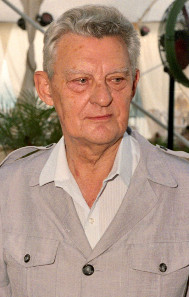by Cecilia Meir
August 21, 2014 – Dr. Arie Kindler, passed away last Wednesday, July 23rd, 2014, at the age of 94.
Dr. Arie Kindler (1920-2014). Photo: Leonid Pedrol-Kavytkovsky.
Dr. Kindler was born on February 17, 1920 in Berlin. From his early childhood he turned to archaeology. One of his early memories was the opening of the Pergamon museum in his hometown Berlin. He arrived in Israel with his family in 1933 after his father realized the impending danger. He joined the Hagana in 1938, serving for 10 years, followed by a service in the Israel Defense Forces from 1948 and reserve service until 1975. During the early 1940s, he used to browse the merchandise of Arab peddlers selling antiquities and coins in the Jerusalem market and became an ardent collector. Though he was deeply interested in ancient history in general and Jewish history in particular, his real devotion was the study of coins. He concentrated on ancient numismatics, becoming a leading authority on Hasmonean coinage.?Dr. Kindler stood at the cradle of the circle for ancient coins, founded on May 10, 1945, which became the Israel Numismatic society in 1949. In 1962 he founded the Kadman Numismatic Pavilion of the Eretz Israel Museum, Tel-Aviv (formerly Haaretz Museum), serving as its director and curator for 35 years.
The museum started with a collection of 2000 coins donated by Leo Kadman (who also financed the building), 1000 from Kindler’s own collection and another 500 coins from Dr. Walter Moses’ collection. These coins became the nucleus of one of the largest and most important collections in Israel. During his 35 years at the Kadman Numismatic Pavilion, Dr. Kindler added some 80,000 items to its collections through donations, legacies and acquisitions. He curated numerous temporary numismatics exhibitions that attracted public interest, but his most important achievement was the opening of the permanent exhibition in 1988. His vision was that his new didactic exhibition should also tell the story of the development of means of payment, from its beginnings in the 7th century BCE to the modern era, emphasizing the history of Eretz Israel as reflected by its coins. Dr. Kindler believed that a curator must be also a researcher, and by the time he completed his formal academic education, he was already a well-known scholar.
His extensive bibliography demonstrates his broad fields of interest and his important contributions to the study of Holy Land numismatics in general and Jewish numismatics in particular. Among his roles, he was the editor of ‘Alon (the Hebrew Journal of the Israel Numismatic society published between 1966 and 1978), and member of the editorial board of the Israel Numismatic Journal. Dr. Kindler published more than 200 scholarly papers in different areas of numismatics, from the Persian period Yehud coins, through Hasmonean, first and second Jewish revolts, city coins, Byzantine and Islamic periods to the coinage of the state of Israel. His publications also included seven monographs on various numismatic subjects. He wrote his Ph.D. dissertation on the coinage of Bostra, which was subsequently published as a book in 1983.
Dr. Kindler lectured at the Israel Numismatic Society and taught at the Department of Classical Studies of the Tel Aviv University (1974–1988) and at Bar Ilan University (1981-1992). He trained numerous students in numismatics, some of whom became experts in the field, as well as collectors, amateurs and the general public. He was the numismatic expert for many archaeological expeditions and published the excavation coin reports.?Arie Kindler is survived by his daughter, Yael, his two grandchildren, David and Chen, and three great-grandchildren?With his death the numismatic circles of Israel have lost one of their most active members, a great scholar and teacher. He will be missed and remembered with gratitude by his friends and colleagues.
This article was first published at the website of the Israel Numismatic Society. Here you will find it.





